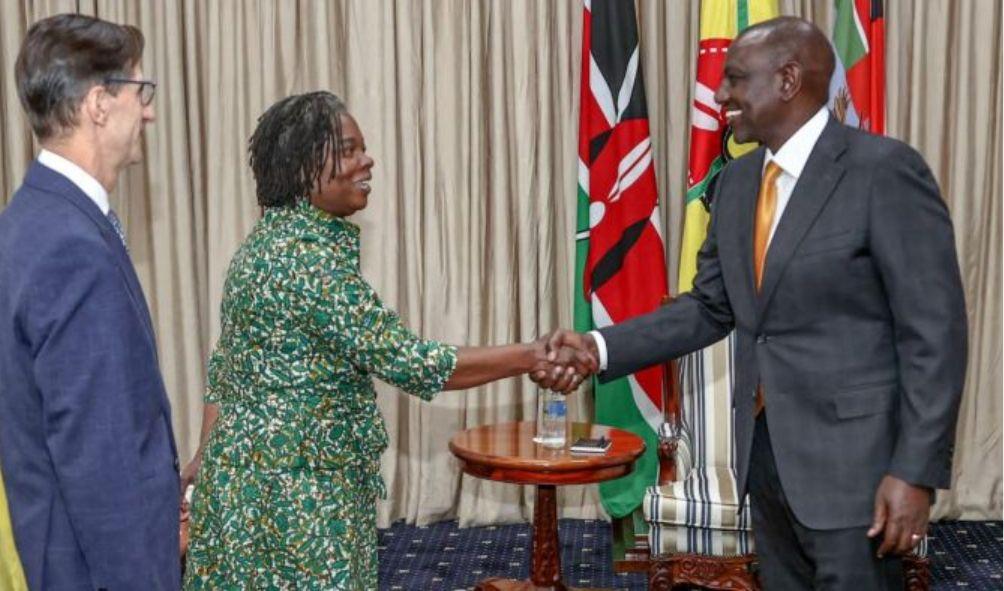World Bank’s 3 Vital Steps for Ruto to Boost Economy
On Monday, July 31, the World Bank provided President William Ruto’s administration with three suggestions for reviving the economy.
World Bank revealed in its Kenya Country Economic Memorandum (CEM) issue titled Seizing Kenya’s Service Momentum that despite Kenya’s impressive post-pandemic recovery, more work was required to attain economic prosperity.
The World Bank specifically entrusted the government with focusing on the management of public debt, openness to trade and robust foreign direct investment, and accelerated job creation.
Managing Kenya’s government debt
On February 7, 2023, President William Ruto and World Bank Regional Vice President for Eastern and Southern Africa Victoria Kwakwa (in green) joined other World Bank officials at the State House in Nairobi.
According to CEM, there has been a significant increase in public debt, which has eroded fiscal space and raised concerns regarding the debt’s sustainability.
The report indicated that although Kenya experienced exponential growth beginning in 2020, it was financed by a government borrowing frenzy.
The Mombasa-Nairobi Single Gauge Railway project culminated in 2017, when debt-financed public investment peaked at over 7 percent of GDP, according to the World Bank.
ALSO READ: President Ruto Furious: Demands CSs Kuria & Kindiki’s Late Arrival Explanation
In addition, it was noted that, even though devolved entities had their benefits, they increased the country’s recurring expenditures.
The government of Ruto was advised that Kenya’s fiscal deficits and rate of debt accumulation needed to be moderated to maintain debt sustainability.
“Although many governments have larger debts relative to GDP, the cost of Kenya’s government debt relative to its revenues is high by global standards,” the report cautioned.
Increasing trade openness and foreign direct investment (FDI).
The World Bank observed that Kenya’s exports remained unbalanced due to its reliance on agricultural exports while exporting fewer services (tourism and travel, transportation, and financial services).
“Consequently, Kenya’s economy is much less trade-oriented than is the norm for peer and aspirational peer economies, depriving it of a major potential engine of growth and job creation,” the report stated regarding the unbalanced trading.
It was recommended that Kenya enter into export markets to generate opportunities for businesses and assist in overcoming the limitation of its still-small domestic market.
The World Bank also noted that FDIs remained low, averaging 1% of GDP, and urged for the sector to be stimulated.
“This will not only augment the limited pool of financing available locally to meet investment needs, but it will also promote structural transformation through positive knowledge spillovers into the domestic economy from firms with international knowledge, and integration into global value chains,” the institution stated regarding the significance of attracting FDIs.
ALSO READ: Kenya’s Economy on a Dangerous Slide
Creating employment opportunities
The World Bank observed that while the country’s poverty levels were gradually declining, this was not translating into enough new high-quality employment.
“Each year, more than 800,000 persons enter the labor force, but formal sector employment has increased by less than 100,000 per year in recent years. According to the report, the overwhelming majority of new entrants find low-productivity, informal work in agriculture, and the non-agricultural informal sector.
Ruto’s government was advised by the World Bank that the realization of a demographic dividend would depend on the availability of sufficiently remunerative employment and earning opportunities, without which the incomes of too many families would remain at subsistence levels.
Ruto was advised, “The economy will need to generate more high-quality jobs than in the recent past, which was characterized by relatively high public spending and a declining role of trade and foreign investment.”
World Bank’s 3 Vital Steps for Ruto to Boost Economy
